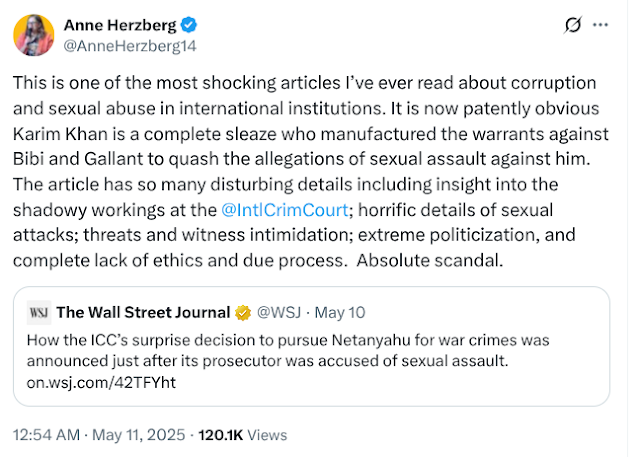By Daled Amos
This past weekend, The Wall Street Journal featured an article reexamining the allegations of sexual harassment against ICC prosecutor Karim Khan. It also focused on the possible connection between those allegations and the warrants he issued against Netanyahu and Gallant.
In the months following Israel's retaliation against Hamas for the October 7 massacre, both pro-Palestinian activists and ICC-member states in developing countries pressured the prosecutor to take action. According to the report, ICC sources indicated that the pressure was so great that Khan "was increasingly lashing out at his team."The casualties of the allegations would include “the justice of the victims that are on the cusp of progress,” [Khan] said to her, according to a record of a call that is now part of an independent U.N. investigation into her allegations. “Think about the Palestinian arrest warrants,” she said he told her on another occasion, according to the testimony.
- Khan tried for months to gain access to Gaza
- Thomas Lynch, an American lawyer and close adviser to the ICC, made arrangements for the trip
- Alan Dershowitz was arranging a private meeting with Netanyahu
- Secretary of State Blinken and National Security Adviser Sullivan pushed Israel to let Khan in, seeing the visit as an important opportunity to convince him against the warrants
- According to ICC minutes of a May 3, 2024, call, Khan told Blinken that he saw the trip as an important opportunity and would need time to analyze the information his team gathered before making a decision on the arrest orders
- April 29, 2024: Khan’s accuser tells Lynch and another colleague that Khan had been sexually abusing her for several months, and she couldn’t take it anymore.
- May 2: Lynch and two other aides confront Khan at his home. They tell him they were reporting the allegations to the court’s human resources office. According to people familiar with the conversation, Khan responds that he would have to resign, adding: “But then people will think I’m running away from Palestine.”
- May 3: Khan speaks with Blinken on the phone about the trip and says he would need time to decide on an indictment.
On the same day, his office puts out a statement that "all attempts to impede, intimidate, or improperly influence its officials cease immediately." There is no mention of the harassment allegations.
- May 5: The ICC’s internal investigation agency contacts his accuser. She refuses to cooperate and will neither confirm nor deny her accusation. She later admits to colleagues that she didn’t want to disrupt the warrants by bringing a complaint against Khan.
- May 19: Khan suddenly tells aids he is cancelling the trip to Israel (set for week of May 27). Lynch was set to fly to Israel the next day to prepare for Khan's visit.
- May 20: Khan announces he is applying for the warrants.
Khan issued the arrest order two-and-a-half weeks after learning of the accusation.
Khan blamed Israel for his decision, saying through his lawyers that “no offer has yet been received from Israel that would permit [access to Gaza]." He claimed this even though Lynch was going to Israel that day to make preparations.
His lawyers claim that since the warrant applications were announced after the ICC had already closed its internal inquiry into the allegations, this disproves any linkage between the allegations and the warrants. On the other hand, if there were enough rumors that an independent UN investigation was found necessary, that could have led Khan to issue warrants to manipulate the situation.
Senior prosecutors and staff say Khan should take a temporary leave of absence to allow the independent UN investigation to do its job. Some ICC officials believe his presence at the court discourages witnesses from cooperating with the investigation. Khan has refused to take a leave.
Meanwhile, Lynch claims that Khan has retaliated against him by moving him out of Khan's office. According to the internal ICC investigation, following Lynch's reporting the allegation of misconduct, Khan's wife told Lynch she heard rumors about him having an "inappropriate relationship" with a colleague, which he denied. Lynch reported that he saw her comments as threatening, but Khan's wife denied making any statement to him “that could reasonably be construed as threatening.”
Anne Herzbert, human rights lawyer and legal advisor to NGO Monitor, commented on the Wall Street Journal article on Twitter:
Hungary already began the process last month to withdraw from the ICC--a move that was passed in its parliament:
Hungary is out. Today the Parliament voted to withdraw from the International Criminal Court. We won’t be part of a politicised institution. pic.twitter.com/mZTlJyi9oj
— Péter Szijjártó (@FM_Szijjarto) April 29, 2025
|
"He's an Anti-Zionist Too!" cartoon book (December 2024) PROTOCOLS: Exposing Modern Antisemitism (February 2022) |
 |

 Elder of Ziyon
Elder of Ziyon


 Buy
Buy 





















